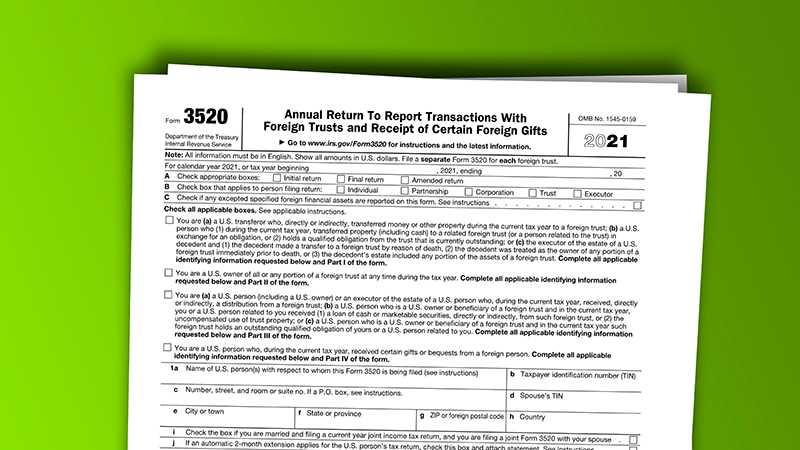Discover how professionals report a foreign gift efficiently
Every little thing You Need to Know About Reporting a Foreign Present: A Comprehensive Overview
Coverage international presents is a vital aspect for U.S. establishments. Recognizing the legal requirements and the effects of non-compliance is crucial for keeping integrity. Organizations should browse complex reporting thresholds and target dates. Proper documentation plays a crucial duty in this process. As the landscape of global contributions progresses, organizations have to adapt their practices appropriately. What are the most effective techniques to ensure compliance and transparency?
Understanding International Gifts: Definition and Scope
While numerous institutions might get different kinds of assistance, comprehending foreign presents calls for a clear meaning and range. Foreign presents describe any materials, solutions, or funds offered by international entities, people, or governments to united state organizations. These presents can be available in numerous types, including cash contributions, home, research financing, and scholarships.
The extent of international presents includes not just straight economic assistance however also in-kind payments that could affect the institution's procedures or research priorities. It is essential for organizations to identify the ramifications of approving such gifts, as they might carry particular conditions or expectations from the benefactor. Understanding the subtleties of international gifts aids organizations in keeping transparency and accountability while promoting international relationships. Inevitably, a detailed understanding of foreign presents is vital for institutions to browse the intricacies of financing and promote their integrity in the academic and research study community.
Lawful Requirements for Reporting Foreign Present

Additionally, federal guidelines may necessitate transparency regarding the sources of funding, especially if linked to sensitive research study areas. Institutions should keep accurate records of foreign presents, ensuring they can corroborate reported payments during audits. This process typically calls for collaboration amongst numerous institutional departments, including money, legal, and compliance groups, to guarantee adherence to both institutional plans and government standards. Comprehending these lawful frameworks is necessary for organizations to effectively take care of and report foreign presents.
Secret Reporting Thresholds and Deadlines
Organizations should know specific reporting due dates and thresholds to validate conformity with guidelines regarding foreign presents. The United State Division of Education and learning calls for institutions to report any type of international presents exceeding $250,000 within a calendar year. This threshold includes both specific presents and collective payments from a solitary foreign resource.
In addition, institutions need to report any type of international gifts surpassing $100,000 to the Foreign Representatives Enrollment Act (FARA) if the gifts are linked to lobbying or political tasks.
Deadlines for reporting are important; establishments are typically called for to send annual records by July 31 for presents gotten during the previous . Failing to fulfill these target dates or limits might bring about charges, including loss of federal funding. Because of this, organizations must establish a persistent surveillance and reporting process to guarantee adherence to these crucial policies.
Exactly How to Effectively Document and Report Foreign Present
Proper documents and coverage of foreign presents call for a clear understanding of the essential conformity steps. This includes sticking to a needed documents checklist and following established reporting procedures. Legal factors to consider need to likewise be taken into account to assure complete conformity with suitable policies.
Called For Documents List
Accurate documentation is crucial when reporting international presents to establish conformity with regulative requirements. Organizations need to maintain a comprehensive document of each present, consisting of the contributor's name, the amount or value of the present, and the date it was obtained. Furthermore, a description of the function of the gift and any type of limitations enforced by the benefactor must be recorded. Correspondence with the donor, such as letters or emails, can give context and confirmation. It is additionally important to consist of any appropriate agreements or agreements. Financial documents, such as financial institution statements or receipts, need to support the value of the present. Correct company and retention of these papers will certainly help with the coverage process and warranty adherence to standards.
Reporting Procedures Review
When navigating the complexities of reporting international presents, it is necessary to comply with well-known treatments to ensure conformity with governing requirements. Organizations needs to begin by determining the nature and worth of the gift, ensuring accurate paperwork. This consists of compiling invoices, benefactor communication, and any kind of pertinent contracts. Next off, entities should send the required forms to the appropriate governmental bodies, usually including the Division of Education or various other marked agencies. It is essential to follow target dates, as tardy submissions may bring about fines. Additionally, maintaining detailed records of the reporting procedure is crucial for future audits. Companies need to train their employees on these procedures to guarantee regular conformity across all divisions.
Compliance and Legal Factors To Consider
Exactly how can organizations ensure they fulfill conformity and legal standards when recording foreign presents? To determine adherence, establishments must develop an extensive reporting structure that includes clear definitions of foreign gifts and limits for reporting demands. Exact documents is important, necessitating detailed records of the present's resource, value, and objective. Organizations must carry out interior plans for timely reporting to appropriate authorities, consisting of federal companies, as stipulated by the International Gifts and Agreements Disclosure Act. Educating staff on conformity protocols and maintaining open lines of communication with legal advice can better boost adherence. Routine audits of foreign gift documentation practices will assist determine prospective compliance voids, ensuring companies promote lawful requirements while promoting transparency in their monetary relationships.
Consequences of Non-Compliance in Coverage
Failing to comply with international gift coverage demands can result in considerable legal fines for institutions. Furthermore, non-compliance may stain an organization's reputation, weakening depend on with stakeholders. Comprehending these effects is important for maintaining both ethical and legal standards.
Lawful Charges for Non-Compliance
Non-compliance in weblink reporting international gifts can result in significant lawful charges that might detrimentally impact establishments and people alike. The Federal government purely enforces regulations surrounding foreign payments, and offenses can cause serious effects, consisting of large fines. Establishments might face penalties getting to thousands of dollars for each and every instance of non-compliance, depending upon the amount of the unreported present. Additionally, people entailed in the reporting process may encounter personal liabilities, including fines or potential criminal fees for willful overlook. The capacity for audits boosts, leading to further examination of monetary techniques. Generally, understanding and sticking to reporting demands is important to stay clear of these significant lawful implications and assurance compliance with federal policies.
Impact on Institutional Reputation
While legal penalties are a considerable concern, the effect on an institution's track record can be just as profound when it concerns failing to report international gifts. Non-compliance can bring about public distrust, destructive partnerships with stakeholders, alumni, and possible donors. Organizations take the chance of being regarded as untrustworthy or doing not have openness, which can deter future financing opportunities. In addition, unfavorable media coverage may magnify these concerns, causing a resilient tarnish on the organization's photo. This disintegration of credibility can have far-reaching effects, consisting of decreased registration, difficulties in employment, and damaged collaborations with other academic or research institutions. Eventually, the failing to stick to reporting demands not only jeopardizes financial security yet also jeopardizes the integrity and reputation of the establishment itself.

Ideal Practices for Managing International Presents in Institutions
Efficiently handling foreign presents in organizations requires a structured strategy that prioritizes openness and conformity. Organizations must develop clear policies detailing the approval, reporting, and utilization of international gifts. A committed board can manage these policies, guaranteeing they align with both institutional worths and governing needs.
Normal training for personnel associated with gift management is important to maintain understanding of conformity responsibilities and moral considerations. Establishments need to perform complete due diligence on prospective international donors to evaluate any type of possible dangers linked with approving their presents.
Furthermore, open interaction with stakeholders, including professors and pupils, promotes count on and reduces worries relating to foreign impacts. Routine audits of foreign gift purchases can aid determine any discrepancies and maintain liability. By carrying out these ideal methods, organizations can properly navigate the intricacies of obtaining foreign presents while securing their stability and track record.
Often Asked Concerns
What Types of Foreign Gifts Are Excluded From Reporting?

Can Foreign Gifts Be Used for Personal Expenditures?
Foreign presents can not be used for individual costs. They are intended for certain purposes, commonly pertaining to instructional or institutional assistance, and mistreating them for individual gain might bring about legal and ethical effects.
Are There Penalties for Late Reporting of Foreign Gifts?
Yes, charges can be imposed for late reporting of international gifts. These might consist of penalties or restrictions on future financing. Prompt conformity is vital to prevent potential lawful and financial repercussions connected with such coverage demands.
How Do Foreign Gifts Influence Tax Commitments?
Foreign presents might influence tax obligations by possibly going through reporting demands and, sometimes, tax. Receivers should reveal these gifts to assure conformity with IRS policies click this link and stay clear of fines or unanticipated tax obligation responsibilities.
Can Establishments Decline Foreign Presents Without Coverage?
Organizations can decline foreign gifts without reporting them, as there is no obligation to approve contributions. report a foreign gift. Nevertheless, if accepted, they should stick to regulatory requirements regarding disclosure and possible effects on tax responsibilities
Foreign presents refer to any type of funds, services, or products offered by foreign entities, individuals, or governments to United state establishments. As establishments involve with international entities, they must browse a complex landscape of lawful demands for reporting foreign presents. Institutions need to preserve a thorough record of each gift, consisting of the donor's name, the quantity or value of the gift, and the date it was received. Non-compliance in reporting international gifts can lead to significant legal fines that may negatively affect institutions and people alike. While check out here lawful fines are a considerable worry, the influence on an institution's reputation can be equally extensive when it comes to failing to report foreign gifts.